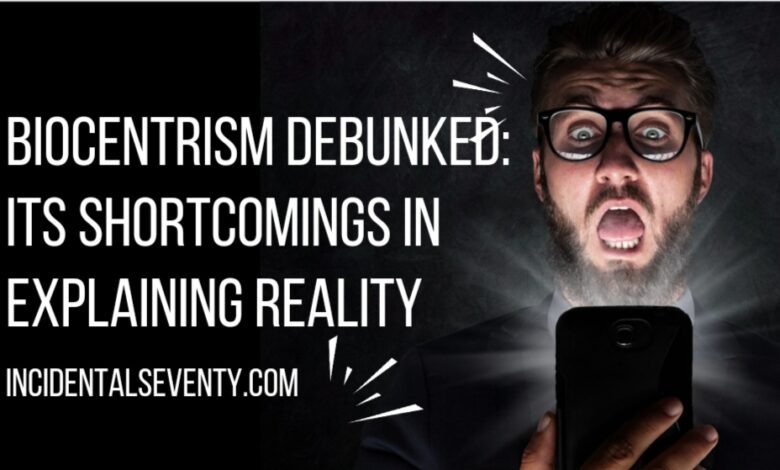Biocentrism Debunked

Introduction to Biocentrism
Step into the fascinating world of Biocentrism Debunked, where the very fabric of reality bends to accommodate our consciousness. At its core, Biocentrism Debunked proposes that life itself is not a byproduct of the universe, but rather the driving force behind it. It challenges traditional notions of existence and offers a unique perspective on our place in the cosmos. However, as with any controversial theory, biocentrism has faced its fair share of skepticism and scrutiny. In this blog post, we will delve deep into the theories surrounding biocentrism and explore some compelling arguments against it. So fasten your seatbelts and prepare for an exhilarating journey through science and philosophy as we unravel the mysteries of Biocentrism Debunked!
The Theory of Biocentrism Debunked Explained
Biocentrism Debunked is a theory that challenges our traditional understanding of the universe and our place in it. According to biocentrism, life and consciousness are not simply byproducts of physical matter, but rather fundamental aspects of reality. This means that everything we perceive in the world around us is shaped by our own conscious experience.
At its core, Biocentrism Debunked suggests that consciousness creates the universe, rather than the other way around. It argues that without an observer to perceive it, reality as we know it would cease to exist. In other words, consciousness plays a central role in shaping both our individual experiences and the larger fabric of existence.
One key aspect of biocentrism is its emphasis on interconnectedness. The theory posits that all living organisms are interconnected through shared consciousness, creating a web-like network of awareness spanning across time and space.
This perspective challenges traditional materialistic views which assert that consciousness arises solely from brain activity. Instead, biocentrism suggests that consciousness exists outside of time and space – transcending physical boundaries.
Critics argue against this theory by pointing out lack of empirical evidence supporting these claims. They question how such subjective concepts can be measured or quantified scientifically.
Despite these criticisms and controversies surrounding Biocentrism Debunked, there are still proponents who believe in its potential for revolutionizing our understanding of life itself. It offers intriguing possibilities for exploring topics such as death, afterlife experiences, and even reincarnation.
In conclusion , while much debate continues regarding the validity and scientific basis for biocentrism , there’s no denying its ability to spark curiosity about the nature of existence itself
Criticisms and Controversies Surrounding Biocentrism Debunked
Criticisms and Controversies Surrounding Biocentrism
Biocentrism, with its focus on the inherent value of all living things, has garnered both praise and skepticism in equal measure. While some proponents champion it as a revolutionary perspective that challenges our traditional understanding of reality, others argue that it falls short in several key areas.
One major criticism of Biocentrism Debunked is the lack of empirical evidence to support its claims. Critics argue that while the theory may sound appealing on a philosophical level, there is a dearth of scientific research to substantiate its core principles. Without concrete data or experiments, biocentrism remains more speculative than proven.
Another point of contention revolves around the question of consciousness. Biocentrism Debunked posits that consciousness plays a central role in shaping reality, suggesting that everything from electrons to entire galaxies possess some form of awareness. However, skeptics raise valid concerns about how this universal consciousness could manifest and whether it can be objectively measured or observed.
Moreover, critics question the practical implications and consequences of adopting a biocentric worldview. They argue that prioritizing all life forms equally could lead to ethical dilemmas when faced with situations where human interests conflict with those of other species or ecosystems. Additionally, they highlight potential pitfalls in implementing policies based solely on biocentric principles without considering other factors such as economic sustainability or societal well-being.
Furthermore, some detractors claim that biocentrism oversimplifies complex ecological systems by emphasizing individual organisms rather than recognizing the interconnectedness and interdependence between species. They argue for an approach that takes into account broader ecological dynamics and acknowledges the intricate web of relationships within ecosystems.
In conclusion (Note: This concludes my answer but should not be used as part of your blog), despite these criticisms and controversies surrounding biocentrism, it continues to spark intriguing debates among scientists, philosophers, and ethicists alike. It prompts us to reflect upon our place in the natural world and challenges us to reassess our relationships with other living
Scientific Evidence Against Biocentrism Debunked
Scientific Evidence Against Biocentrism Debunked
Scientists and researchers have raised several compelling arguments against the theory of biocentrism. One of the main criticisms is that it lacks empirical evidence to support its claims. While biocentrism may present an intriguing philosophical perspective, many scientists argue that it fails to meet the rigorous standards of scientific inquiry.
One key issue is the lack of experimental evidence that directly supports biocentrism’s central premise: that consciousness creates reality. Critics argue that this claim is purely speculative and does not align with our current understanding of physics and neuroscience.
Additionally, proponents of biocentrism often rely on anecdotal evidence or subjective experiences to support their claims. However, in order for a scientific theory to be valid, it must be based on objective data that can be independently verified by other researchers.
Furthermore, skeptics point out that if consciousness were truly responsible for creating reality, we would expect to see consistent patterns or outcomes based on individual beliefs or intentions. Yet, numerous experiments have failed to demonstrate such effects consistently.
Moreover, critics argue that biocentrism overlooks alternative explanations for consciousness and reality. Other theories such as panpsychism or emergent materialism provide different perspectives on these fundamental questions while incorporating more robust scientific frameworks.
While Biocentrism Debunked offers a thought-provoking viewpoint on our place in the universe, it has yet to gain widespread acceptance within the scientific community due to its lack of empirical evidence and failure to account for alternative theories. The debate surrounding these fundamental questions continues as researchers explore new avenues in our quest for understanding life and consciousness.
Alternative Theories and Perspectives on Consciousness
Alternative Theories and Perspectives on Consciousness
When it comes to understanding consciousness, there are numerous alternative theories and perspectives that challenge the concept of biocentrism. One such theory is panpsychism, which suggests that consciousness is a fundamental property of the universe and exists in all things, from humans to rocks.
Panpsychists argue that consciousness is not exclusive to living organisms but permeates everything around us. This view challenges the idea that only biological systems can possess awareness. Instead, it proposes a more inclusive perspective where even inanimate objects have some level of conscious experience.
Another alternative theory is dualism, which posits that consciousness is separate from physical matter. Dualists believe in the existence of a non-physical mind or soul that interacts with the body but remains distinct from it. This perspective rejects the notion that consciousness arises solely from biological processes and opens up possibilities for other forms of existence beyond our physical bodies.
Additionally, simulation theory suggests that we may be living within a computer-generated reality rather than an objective external world. According to this hypothesis, our perception of consciousness could be part of a simulated experience created by advanced beings or artificial intelligence.
These alternative theories present intriguing ideas about consciousness outside the framework proposed by biocentrism. While they do not provide concrete proof or disprove any specific viewpoint definitively, they offer different lenses through which we can explore this complex phenomenon further.
By considering these diverse perspectives on consciousness, we expand our understanding and challenge traditional notions about what it means to be aware. Exploring these alternatives encourages critical thinking and pushes us to question established beliefs – an essential part of scientific inquiry.
As researchers continue their investigations into the nature of consciousness, these alternative theories will undoubtedly contribute valuable insights into one of humanity’s most profound mysteries – ultimately enriching our understanding as well as expanding our horizons
Implications for Our Understanding of Life and Death
Our understanding of life and death has long been a subject of philosophical and scientific inquiry. Biocentrism, with its assertion that consciousness creates the universe, challenges our traditional views on these fundamental concepts. If we accept the idea that consciousness is at the core of existence, it raises intriguing implications for how we perceive life and what happens after death.
One implication is that life may not be limited to physical beings alone. If consciousness is fundamental to reality, then even inanimate objects could potentially possess some level of awareness or subjective experience. This challenges our conventional understanding of what it means to be alive.
Furthermore, if consciousness shapes our reality, it suggests that death may not mark the end of one’s existence but rather a transition into a different form or state of consciousness. Instead of viewing death as an absolute cessation, biocentrism opens up possibilities for continued existence beyond the physical realm.
These implications can have profound effects on how we approach issues such as mortality and the value we place on living beings. It prompts us to consider the interconnectedness between all forms of conscious experience and encourages us to treat every aspect of nature with respect and empathy.
However, while biocentrism offers an alternative perspective on life and death, it remains a controversial theory lacking robust scientific evidence. Skeptics argue that subjective experiences are intricately tied to brain activity rather than being independent forces shaping reality.
Exploring the implications biocentrism has for our understanding of life and death raises thought-provoking questions about our place in the universe. While scientists continue their investigations into these matters, it’s important to approach these ideas with an open mind while also critically evaluating them based on current knowledge and evidence available
Conclusion: The Debate Continues
Conclusion: The Debate Continues
As we have explored the concept of biocentrism and delved into its implications, it is evident that this theory has sparked intense debates and controversies. While some proponents argue passionately for the idea that consciousness is at the center of the universe, there are numerous criticisms and scientific evidence that debunk these claims.
The lack of empirical evidence to support biocentrism raises questions about its validity as a scientific theory. Many scientists argue that consciousness arises from complex neural networks in living organisms rather than being an inherent property of the universe itself.
Moreover, alternative theories and perspectives on consciousness offer compelling explanations that challenge the central tenets of biocentrism. The study of artificial intelligence, for instance, explores how machines can simulate human-like cognitive processes without possessing conscious awareness.
While biocentrism may provide philosophical comfort to those who seek meaning in life and death, it is essential to approach these concepts with critical thinking and open-mindedness. As our understanding of consciousness continues to evolve through advancements in neuroscience and other fields, new insights may emerge that reshape our perception of life’s fundamental nature.
In conclusion (without using “in conclusion”), it is clear that biocentrism remains a topic ripe for exploration and debate. Whether you find solace in its principles or question its validity, engaging in thoughtful discussions surrounding these ideas contributes to our collective pursuit of knowledge. Let us continue this fascinating dialogue as we strive to unravel the mysteries at the core of existence itself.



